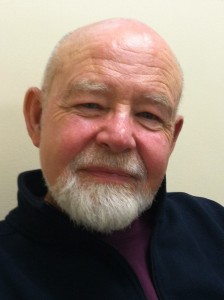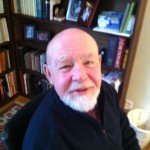. . . . To My Beloved Husband Well over two decades ago, I’d just left a dangerously destructive marriage. I was terrified of another relationship, but lonely as hell. There was Jerry, my colleague in the English Department for lo those many years, himself having just eased out of a sad marriage. In our advance-and-retreat pas-de-deux, he was the perfect, gracious gentleman, leaving me all the time I needed to see what I needed. My head screamed “NO!” My heart played interception. “I will never hurt you,” he said. Verily, he spake the truth.Jerry’s the one you want with you if you are really sick, and he is the one you want with you if you want to have a good time. He’s interested in most everything except science, science-fiction, pretentious literary theory, and animated feature films. He’s been a sessions singer in Nashville, he’s dated Pat Boone’s sister, had drinks with Robert Penn Warren, watched Elvis rehearse. He’s remodeled an eighteenth-century farmhouse, coached his daughters’ softball teams, farmed his 15 acres, as well as fronted a successful rock and roll band (“Jerry and the Juveniles”) while chairing a 60-member English Department, writing and editing seven books, being general editor of the works of the eighteenth century writer Tobias Smollett.. . . well, just to give him his due, before I get to what I really want to say.Jerry is nurturing. He’ll rub my feet until his hands get numb. He’s downstairs right now doing the laundry. He washes and folds it all, every week. He washes the dishes. (I cook! I’m not useless). He likes to do these things. He’s a detail person. When I got sick, he took my car to get the snow tires on, he took it in for service, filled it up with gas. He’s run dozens and dozens of errands for me. He wants to go to every daily radiation treatment, just to be with me. But he’s not cloying. He lines up my multitudinous pills for me and reminds me, but that’s because he knows how I am. He steps back if he thinks I’ve had enough of management, or closeness.He respects me. He’s not interested in Buddhist meditation, but he’s supported my practice by cheerfully sending me off to retreats (maybe he’s glad for the break!) and has never made one disparaging or dismissive comment.He's read and helped me edit almost every word I've written.He knows how to take care of himself. He’s going semi-weekly to a caregiver’s support group. So far, he’s the only one who shows up, but he likes the woman, so they keep talking. He has his own health issues which have been a trial for him for over two years—complicated neuropathy with possible spinal involvement, plus. He doesn’t martyr himself on the altar of my cancer. He’s doing what he can for himself with hopes that we can get to Mayo and see what the heck’s going on with him as soon as I’m through with all this.When I found that I’d need to have eye surgery in the middle of cancer treatment, he was in the retinal surgeon’s office with me. We were alone, waiting for the surgeon to come in. He looked up at me. Tears started down his cheeks. “You are so strong,“ he said. “And I see you sitting there looking so small and vulnerable. It hurts me.”So basically, this is in praise of our being able to cry together, which we’ve done face-to-face with fear, when it comes up, with sadness, when it comes up, and with sheer frustration, when it comes up. This is in praise of a man who tells me every day how beautiful I am, with my silly chemo hats and abdomen full of puncture scars, who runs his hand over my barely furry scalp as if I were Cleopatra.
Well over two decades ago, I’d just left a dangerously destructive marriage. I was terrified of another relationship, but lonely as hell. There was Jerry, my colleague in the English Department for lo those many years, himself having just eased out of a sad marriage. In our advance-and-retreat pas-de-deux, he was the perfect, gracious gentleman, leaving me all the time I needed to see what I needed. My head screamed “NO!” My heart played interception. “I will never hurt you,” he said. Verily, he spake the truth.Jerry’s the one you want with you if you are really sick, and he is the one you want with you if you want to have a good time. He’s interested in most everything except science, science-fiction, pretentious literary theory, and animated feature films. He’s been a sessions singer in Nashville, he’s dated Pat Boone’s sister, had drinks with Robert Penn Warren, watched Elvis rehearse. He’s remodeled an eighteenth-century farmhouse, coached his daughters’ softball teams, farmed his 15 acres, as well as fronted a successful rock and roll band (“Jerry and the Juveniles”) while chairing a 60-member English Department, writing and editing seven books, being general editor of the works of the eighteenth century writer Tobias Smollett.. . . well, just to give him his due, before I get to what I really want to say.Jerry is nurturing. He’ll rub my feet until his hands get numb. He’s downstairs right now doing the laundry. He washes and folds it all, every week. He washes the dishes. (I cook! I’m not useless). He likes to do these things. He’s a detail person. When I got sick, he took my car to get the snow tires on, he took it in for service, filled it up with gas. He’s run dozens and dozens of errands for me. He wants to go to every daily radiation treatment, just to be with me. But he’s not cloying. He lines up my multitudinous pills for me and reminds me, but that’s because he knows how I am. He steps back if he thinks I’ve had enough of management, or closeness.He respects me. He’s not interested in Buddhist meditation, but he’s supported my practice by cheerfully sending me off to retreats (maybe he’s glad for the break!) and has never made one disparaging or dismissive comment.He's read and helped me edit almost every word I've written.He knows how to take care of himself. He’s going semi-weekly to a caregiver’s support group. So far, he’s the only one who shows up, but he likes the woman, so they keep talking. He has his own health issues which have been a trial for him for over two years—complicated neuropathy with possible spinal involvement, plus. He doesn’t martyr himself on the altar of my cancer. He’s doing what he can for himself with hopes that we can get to Mayo and see what the heck’s going on with him as soon as I’m through with all this.When I found that I’d need to have eye surgery in the middle of cancer treatment, he was in the retinal surgeon’s office with me. We were alone, waiting for the surgeon to come in. He looked up at me. Tears started down his cheeks. “You are so strong,“ he said. “And I see you sitting there looking so small and vulnerable. It hurts me.”So basically, this is in praise of our being able to cry together, which we’ve done face-to-face with fear, when it comes up, with sadness, when it comes up, and with sheer frustration, when it comes up. This is in praise of a man who tells me every day how beautiful I am, with my silly chemo hats and abdomen full of puncture scars, who runs his hand over my barely furry scalp as if I were Cleopatra. I’ve gotten irritated with him—he’s a tortoise and I‘m a hare—I’ve gotten frustrated by his meticulous attention to lining up the details in order. But not once, in 21 years of marriage, have I regretted marrying him. We’ve been good for each other. We still are. Thank you, Jerry, for waiting with infinite patience until the moment—over two years from our first beer together—when I finally pled, “Oh, please PLEASE marry me!”
I’ve gotten irritated with him—he’s a tortoise and I‘m a hare—I’ve gotten frustrated by his meticulous attention to lining up the details in order. But not once, in 21 years of marriage, have I regretted marrying him. We’ve been good for each other. We still are. Thank you, Jerry, for waiting with infinite patience until the moment—over two years from our first beer together—when I finally pled, “Oh, please PLEASE marry me!”
YEA! THE MOMENT YOU’VE BEEN WAITING FOR! : Growing Old in Poetry: Two Poets, Two Lives, from Autumn House Books, is now out on Kindle, $9.99.Go to Amazon, type in the title. Get your grandkids to do it for you! You’ll find this book of essays, a back-and-forth between Sydney Lea (current poet laureate of VT) and me (former poet laureate of DE), a comforting collection of geezerly thoughts about poetry today, about what’s happened to books, to reading, to sex, to our wilderness places, and what matters to us as poets, as poet-people, and as great friends.Please, if you have a moment, write a brief review, even one line, like “Wow, I liked this a lot!” Amazon places their books according to the number of reviews. Give us a boost at the beginning! Thanks.
